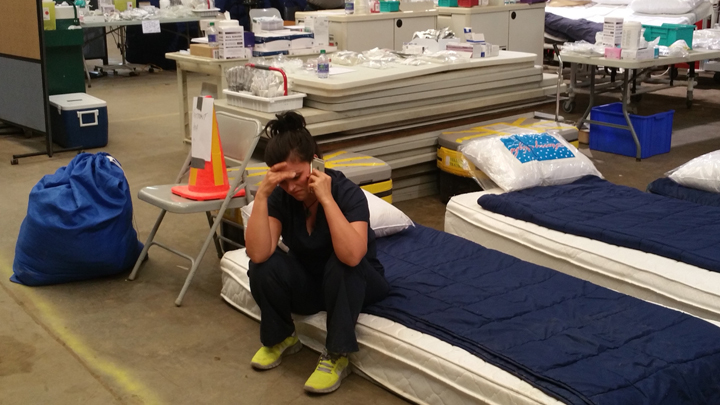
May 19, 2016

Lisa McQuillan, RN, in the Firebag hangar that AHS transformed into a temporary triage clinic. Staff worked long hours in challenging conditions to ensure high-quality patient care in the midst of a disaster.
Story by Sean Woods; Photo by David Matear
FORT MCMURRAY - When Dr. Brian Dufresne flew into Suncor’s Firebag site to relieve the initial physicians involved with the Northern Lights Regional Health Centre (NLRHC) evacuation, he was amazed by what he saw.
“I arrived almost 48 hours after the (hospital) evacuation, and the initial evacuation team of Nurses and Physicians had done an incredible job setting up a triage clinic in an empty hanger,” recalls the emergency department (ED) physician who arrived in Firebag on May 5. “They are the real heroes, and had been working non-stop. It just reflects the personalities that people have in that situation, and the people who were on that day did an incredible job.”
David Matear, Senior Operating Director for Fort McMurray was in the last group of staff to leave the hospital. When he reached Firebag, everyone was working together seamlessly to ensure patients were taken care of.
“Physicians, EMS, everybody who was able were actually carrying continuing care clients up the steps into the aircraft,” he recalls. “Even at that point we knew there was another phase coming, dealing with all of the requirements of that area.”
“We had new patients coming in who were having medical issues,” explains Monique Janes, patient care director from Fort McMurray, who had also evacuated with the rest of the NLRHC patients and staff, as well as helping with operations in Firebag. “We were essentially running an emergency room in Firebag. We had people coming in who were sick with a variety of issues, including respiratory and cardiac problems, so we had to triage and medevac them as appropriate.”
Dr. Dufresne, Dr. Ian Phelps and others took over where the initial group had left off, treating and triaging patients at the modified hangar.
Physicians and staff worked 24 to 36 hours straight to assess patients and get them on flights to the south during this second wave of evacuations.
“At any one time there were between three and five 737s on the runway, and we had a couple dedicated medevac planes at our disposal,” adds Dr. Dufresne. “So I think all-in-all the transfer of critical patients was fairly quick and smooth.”
When these flights returned to Firebag, they often brought supplies and relief staff. ED nurse Melanie James was among those who rushed in to help. Born and raised in Fort McMurray, James found out about the scale of the wildfire and evacuation when she arrived for a holiday in Thailand after a 12 hour flight.
“We landed in Thailand, turned on our phones and had messages saying that the whole city had been evacuated,” recalls James, who lives in Fort McMurray with her fiancée who is a firefighter. “We saw the pictures and we both just knew we had to get there. The next morning we both traveled to Fort McMurray to help.”
James provided support to the remaining continuing care patients, as well as helping those who needed prescription refills or were feeling anxiety.
Dr. Dufresne and others were planning to stay until May 9, but had to evacuate the Firebag site on May 7 due to incoming smoke. By that time, the population had been reduced to a minimum at the site, as most had already been evacuated to Edmonton.
Matear can attest to the dedication of people like James and Dr. Dufresne.
“We were up in Firebag, trying to get people to leave there – they need a rest and you have to obviously cycle people out. It was very difficult – nobody wanted to leave. Everyone wanted to stay, to work on, everyone was just so committed.”
Dr. Dufresne would later head back to Fort McMurray to help establish a ground clinic and provide care to anyone involved in the emergency response still in the community. As for James, she’s also eager to return.
“To be honest, I didn’t want to leave,” says James, who hopes to be redeployed to Fort McMurray soon. “It’s home for me, and I want to do anything I can to get it back to normal. There are a lot of us wishing we could be there.”